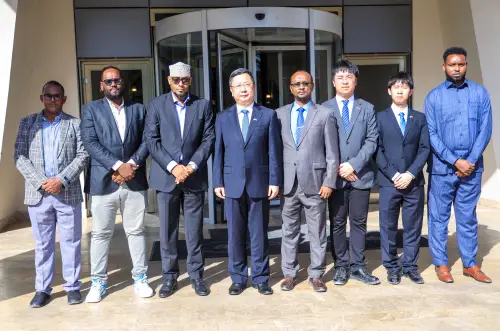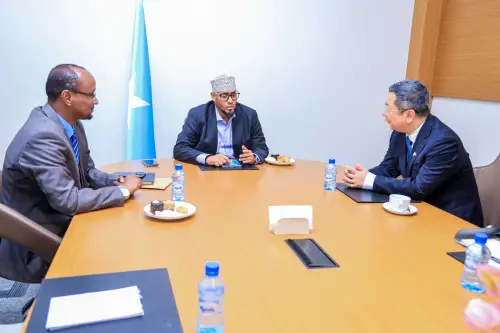China’s growing diplomatic presence in Africa has garnered increasing attention, particularly from North America and Europe, as Beijing continues to expand its influence across the continent. A recent farewell roundtable hosted by the Chinese Embassy in Somalia, which celebrated the departure of Somali officials for a training program in China, highlights an important aspect of China’s engagement strategy in Africa—capacity building. As young officials from Somalia’s Ministry of Interior, Federal Affairs, and Reconciliation prepare to embark on their educational journey, the event underscored Beijing’s ongoing efforts to deepen ties with African nations through strategic partnerships, investments, and education.
The diplomatic impact of China’s sustained efforts in Africa, especially through initiatives like the Forum on China-Africa Cooperation (FOCAC), is profound. For North America and Europe, the expansion of Chinese influence in Africa poses both a diplomatic challenge and a geopolitical dilemma. Africa has long been a focus of Western foreign policy, particularly in terms of development aid, military partnerships, and economic cooperation. However, China’s increasingly assertive role in the region is recalibrating the power dynamics, challenging traditional Western approaches, and raising questions about the future of global alliances.
China’s Diplomatic Strategy: Beyond Economic Aid
Historically, China’s presence in Africa has been primarily characterized by infrastructure investments and economic aid. Over the past two decades, Chinese investments in African infrastructure—such as roads, railways, ports, and energy projects—have positioned Beijing as a key development partner for many African nations. However, the recent focus on educational exchanges and personnel training, as seen in Somalia, represents a shift toward a more comprehensive diplomatic strategy. This shift includes not only economic support but also political influence, social engagement, and ideological promotion.
Through programs like FOCAC, China has effectively positioned itself as a partner in Africa’s long-term development, offering an alternative to the Western model of aid that often comes with conditions related to governance and human rights. China’s approach, often described as non-interference in internal affairs, appeals to many African governments that are looking for partnerships without the stringent demands often attached to Western aid. In the case of Somalia, where rebuilding efforts continue after decades of conflict, China’s assistance in training government officials is an important aspect of this strategy, aiming to bolster the country’s internal governance and administration.

The Diplomatic Impact on North America and Europe
For North America and Europe, China’s expanding role in Africa is not just a regional concern but a global one. As China builds stronger political ties with African nations, it is increasingly able to influence the direction of multilateral organizations where African votes matter, such as the United Nations. With 54 nations, Africa holds significant sway in international forums, and China’s ability to align African votes with its foreign policy goals could challenge Western interests on a global scale.
Moreover, China’s diplomatic push in Africa could erode Western influence in key areas such as security, trade, and governance. For example, China’s Belt and Road Initiative (BRI) has already reshaped economic relations between African countries and the rest of the world. Through extensive infrastructure projects, China is creating new trade corridors that link African markets more directly with Asia, potentially reducing the influence of traditional trade partners like the U.S. and Europe. In addition, as African nations become more economically dependent on China, they may adopt more favorable policies toward Beijing in other diplomatic arenas, further weakening Western influence.
Security Implications
China’s growing presence in Africa also has security implications. While China’s military footprint in Africa remains small compared to its Western counterparts, there are signs that this could change. The establishment of China’s first overseas military base in Djibouti in 2017 signaled Beijing’s intent to protect its economic interests and exert greater control over key maritime routes, such as the Gulf of Aden. As China continues to strengthen ties with African nations, including through military cooperation and training programs, its ability to project power on the continent may increase, challenging the long-standing security partnerships between African nations, the U.S., and European countries.
The U.S. and its European allies have traditionally viewed Africa as a region of strategic importance, both in terms of counterterrorism and global trade. With China’s growing influence, Western nations are likely to face greater challenges in maintaining their security presence and partnerships in Africa. The competition for military alliances and influence in regions like the Horn of Africa, which borders critical maritime trade routes, will likely intensify in the coming years.
A Call for Western Engagement
China’s diplomatic maneuvering in Africa should serve as a wake-up call for North America and Europe. While the West has historically viewed its relationships with African nations through the lens of aid and security, China’s more multifaceted approach—combining economic investments, political partnerships, and educational exchanges—offers African nations a compelling alternative. If the U.S. and Europe wish to remain relevant players in Africa, they will need to rethink their strategies and offer more flexible, mutually beneficial partnerships.
The diplomatic impact of China’s presence in Africa is already being felt across the world, and its influence will likely continue to grow in the years ahead. For North America and Europe, engaging with African nations on equal terms, without the baggage of conditionality, maybe the only way to counterbalance China’s growing clout. Whether through increased investment, educational exchanges, or closer political ties, the West must act decisively if it hopes to maintain its influence in a rapidly changing geopolitical landscape.



